|
|
|
Sort Order |
|
|
|
Items / Page
|
|
|
|
|
|
|
| Srl | Item |
| 1 |
ID:
145143
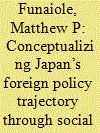

|
|
|
|
|
| Summary/Abstract |
Regional security studies of the Asia-Pacific commonly center upon China’s rise, leaving other actors underresearched. Among these is Japan, whose ongoing reinterpretation of its pacifist constitution may destabilize the region. This article employs Social Identity Theory, a social psychology theory of group behavior, to develop a unique framework that accounts for both the domestic and international constraints acting upon Japan’s foreign policy makers. By analyzing Japan’s foreign policy evolution through the lost decade of the 1990s into the changed landscape of the post-September 11th world, this article identifies a prevailing trend toward “normalization”. It is argued that Japan is on course to further distance itself from the pacifism embodied in Article 9 of its constitution.
|
|
|
|
|
|
|
|
|
|
|
|
|
|
|
|
| 2 |
ID:
177018
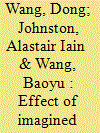

|
|
|
|
|
| Summary/Abstract |
Social identity theory (SIT) suggests that perceived identity difference between groups predicts to intergroup conflict, including interstate conflict. Contact theory suggests that social contact between groups can help reduce intergroup conflict. Contact theory, however, has not traditionally focused on perceived identity difference, and it has not been tested much on real-world interstate conflicts. Employing an experimental design, our study tests for the effects of imagined social contact on Chinese students’ generally malign perceptions of identity difference with Japanese people. We find that imagined contact reduces key perceptions of difference by reducing both perceived Japanese malignity and perceived Chinese benignity. This suggests that social contact helps produce new hybrid in-group. By employing SIT, our findings provide a new microfoundation for contact theory, suggest an important process in the creation of security communities, and provide a proof of concept for public policies aimed at large-scale cultural exchanges.
|
|
|
|
|
|
|
|
|
|
|
|
|
|
|
|
| 3 |
ID:
141640


|
|
|
|
|
| Summary/Abstract |
Party identification is central to the study of American political behavior, yet there remains disagreement over whether it is largely instrumental or expressive in nature. We draw on social identity theory to develop the expressive model and conduct four studies to compare it to an instrumental explanation of campaign involvement. We find strong support for the expressive model: a multi-item partisan identity scale better accounts for campaign activity than a strong stance on subjectively important policy issues, the strength of ideological self-placement, or a measure of ideological identity. A series of experiments underscore the power of partisan identity to generate action-oriented emotions that drive campaign activity. Strongly identified partisans feel angrier than weaker partisans when threatened with electoral loss and more positive when reassured of victory. In contrast, those who hold a strong and ideologically consistent position on issues are no more aroused emotionally than others by party threats or reassurances. In addition, threat and reassurance to the party's status arouse greater anger and enthusiasm among partisans than does a threatened loss or victory on central policy issues. Our findings underscore the power of an expressive partisan identity to drive campaign involvement and generate strong emotional reactions to ongoing campaign events.
|
|
|
|
|
|
|
|
|
|
|
|
|
|
|
|
| 4 |
ID:
107927
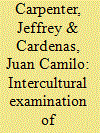

|
|
|
|
|
| Publication |
2011.
|
| Summary/Abstract |
We design a real-time, intercultural common pool resource experiment using participants from cultures that derive different benefits from a global public good (extraction vs. conservation of biodiversity resources) to analyze the effect of group affiliation on cooperative behavior. We also collect survey attitudes toward conservation to augment our experimental results. We find that when participants interact interculturally, extraction choices change significantly and that these changes can be attributed to an amplification of the relationship between attitudes and choices cued by the intercultural treatment.
|
|
|
|
|
|
|
|
|
|
|
|
|
|
|
|
| 5 |
ID:
174836


|
|
|
|
|
| Summary/Abstract |
This study builds on the experiences of a Dutch reconnaissance platoon deployed in Afghanistan in which leadership was not accepted. Setup as a qualitative single case study, this article advances our understanding of how group dynamics and contextual factors might impact the acceptance of leadership. Rather than primarily focusing on the behavior of the leader, this article highlights the perspective of followers in the ranks. The study also offers empirical evidence for the potential of social identity theory as a framework within which to study leadership acceptance. The case shows that leadership acceptance is largely dependent on group processes rather than on the characteristics of leadership. Additionally, it points to the importance of contextual factors. Finally, it suggests that a lack of attention to in-group dynamics, and a lack of active entrepreneurship by the leader, can catalyze “in-group entrepreneurship.”
|
|
|
|
|
|
|
|
|
|
|
|
|
|
|
|
| 6 |
ID:
170034


|
|
|
|
|
| Summary/Abstract |
Dissatisfied with their relative standing in the world, China and Russia are challenging the US-dominated liberal order. Could US accommodation of their status concerns reduce conflict? The psychological rationale for status accommodation is rooted in the insights of social identity theory (SIT), which argues that persistent status denial leads lower-status groups to “lash out.” Steven Ward (2017) objects that political scientists have misinterpreted SIT. In his view, impermeable group boundaries only affect individuals and do not lead to intergroup conflict. Ward's narrow critique overlooks the larger meaning and significance of SIT, which is about how frustration and anger over status barriers and unfair treatment motivate lower-status groups to challenge the status quo. Social competition is positional and zero-sum. Given the insights of SIT, Ward's recommendation that the United States demonstrate to China and Russia the futility of status competition is likely to provoke a backlash and increase the risk of military conflict. Instead, SIT implies a continuing process of status accommodation and efforts to maintain the legitimacy and stability of US leadership.
|
|
|
|
|
|
|
|
|
|
|
|
|
|
|
|
| 7 |
ID:
157547
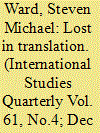

|
|
|
|
|
| Summary/Abstract |
Chinese and Russian foreign policy, in part, reflects both countries’ ambitions for higher status in the international system. This implies a critical question: can accommodating these ambitions prevent, or even reverse, the turn toward geopolitically competitive grand strategies by Moscow and Beijing? In other words, might accommodation lead them to channel their efforts in more benign directions? The dominant framework for analyzing the ways in which states seek status—a framework rooted in the insights of Social Identity Theory (SIT)—suggests that the answer is yes: status-seekers will most likely turn toward geopolitically competitive strategies when they face apparently “impermeable” obstacles to their ambitions. I argue that this framework depends on a “mistranslation” of SIT. Properly translated, the theory tells us little about the consequences of persistent status denial for international politics. Instead, it implies that status-seeking will resolve into geopolitical competition when, first, participants view geopolitically significant resources as markers of status and, second, when leaders believe that they can successfully change the distribution of status. I use analyses of two prominent cases that should prove friendly ground for the conventional translation of SIT—Germany before World War I and Imperial Japan—to demonstrate the serious problems that plague the framework favored by international relations scholars, especially with respect to its central claim about the link between persistent status denial and geopolitical competition.
|
|
|
|
|
|
|
|
|
|
|
|
|
|
|
|
| 8 |
ID:
075703


|
|
|
|
|
| Publication |
2006.
|
| Summary/Abstract |
There have been several studies conducted about racist groups, gangs, cults, terrorist and other criminal organisations, but very little has been written about the psychology and recruitment process of the 'narcotrafficker'. This is because like most criminal organisations, they tend to be secretive and difficult to penetrate by law enforcement, academics and others who wish to study them. Using an audio?recorded content analysis of 'narcocorridos' - ballads glorifying the activities of the 'narcos' and describing their successes' - as well as Social Identity and Group theories, the author describes some of the techniques used to recruit individuals into drug cartels; the labels, stereotypes and images of the in-group versus the out-group and the similarities in the socialisation and recruitment process of other criminal organisations. This study shows the recruitment of individuals into drug cartels follow similar patterns to other criminal organisations including the need for power, belonging, respect, security and pride.
|
|
|
|
|
|
|
|
|
|
|
|
|
|
|
|
| 9 |
ID:
192871
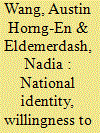

|
|
|
|
|
| Summary/Abstract |
Why do people risk their lives fighting in wars? This article looks beyond group grievance and material benefits to add another psychological mechanism explaining why people choose to fight or not to fight – perceived collective action. An individual is much more likely to fight when they perceive that others will also fight. Contrary to the expectations of social identity theory and social pressure theory, the effect of perceived collective action is stronger among those who have a weaker national identity because they are more likely to rationally calculate the chance of winning by accounting for others’ decisions. To mitigate the endogeneity in post-conflict cross-sectional surveys, we conduct a survey experiment (n = 1,001) in Taiwan manipulating perceptions of others’ willingness to fight in a potential China–Taiwan military conflict. Experimental evidence supports the hypotheses that perceived collective action works only on weak Taiwanese identifiers. The result holds in robustness checks and in another nationally representative survey.
|
|
|
|
|
|
|
|
|
|
|
|
|
|
|
|
| 10 |
ID:
151146
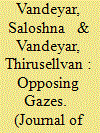

|
|
|
|
|
| Summary/Abstract |
Utilising a qualitative case study approach, this research study set out to understand discrimination experienced by immigrant students in their interactions with South African students and the prejudice immigrant students expressed against Black South African students. Findings reveal that the discrimination experienced by immigrant students could be clustered into four broad themes, namely categorisations and prototypes; practised stereotypes; academic and social exclusion; and work ethic. Furthermore, statements immigrant students make about South African students seem to fall into two broad categories, namely lack of value for moral integrity and lack of value for education. Educating students to value human dignity and to view each other as cosmopolitan citizens of the world could be a way to ensure social cohesion and harmony of future generations to come.
|
|
|
|
|
|
|
|
|
|
|
|
|
|
|
|
| 11 |
ID:
148785


|
|
|
|
|
| Summary/Abstract |
Constructivism has a problem in accounting for agent-led change and for what motivates agents to make up their minds about how to put their agency to use. I show that constructivism’s problem of change is related to tensions between constructivism’s own key assumptions about the mutually constitutive relationship between structure and agency, understanding of change and to an essentialist conception of identity. I argue that agency is constituted through processes of ‘identification’ involving identity and narrative constructions and performance through practice and action. I make the perhaps controversial move to regard ontological security as a precondition for agent-led change and to identify ontological security maximisation as functionally equivalent to rationalist theories’ agent assumption of utility maximisation. I identify two strategies for maximising ontological security: a ‘strategy of being’ to secure a stable and esteem-enhancing identity and a strong narrative; and a ‘strategy of doing’ to ensure cognitive consistency through routinised practice whilst also undertaking action contributing to a sense of integrity and pride. The article concludes that although humans are endowed with agency, their actual ability to utilise their agency is severely constrained by their need for maintaining ontological security, which may explain why change appears so difficult to achieve.
|
|
|
|
|
|
|
|
|
|
|
|
|
|
|
|
| 12 |
ID:
082706
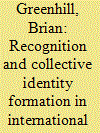

|
|
|
|
|
| Publication |
2008.
|
| Summary/Abstract |
Applying the model of `recognition politics' to international relations can help to explain the identity-based elements of international conflicts that rationalist models leave out. This article uses psychological theories of identity formation to critically assess the recent move by constructivist scholars (most notably Alexander Wendt) to bring the Hegelian idea of the `struggle for recognition' into the study of IR. Examining recognition theory in this way shows that while the insights of `identity theory' developed in the symbolic interactionist tradition lend support to the idea that recognition of the `other' is essential to constituting the identity of the `self', much of the experimental work carried out within Social Identity Theory and its related fields fails to support the claim that recognition leads to the formation of an over-arching collective identity. Without a credible mechanism for collective identity formation, recognition theory fails to predict fundamental change in the international system.
|
|
|
|
|
|
|
|
|
|
|
|
|
|
|
|
| 13 |
ID:
178598


|
|
|
|
|
| Summary/Abstract |
This article examines the rigid boundaries in relations between China and Turkey by applying social identity theory to international relations. It evaluates different networks of political alliance and external cultural-ethnic ties as rigid boundaries between the two countries. Turkey-China relations have been shaped by both inter-systemic and inter-state dynamics. Therefore, to show how social context and the permeability of social structure have affected the nature of bilateral relations, this article divides relations into two historical contexts of Cold War and post-Cold War periods. It concludes that it will be hard to go beyond rigid boundaries as long as each side has its own solutions to problems between the two countries.
|
|
|
|
|
|
|
|
|
|
|
|
|
|
|
|
| 14 |
ID:
091024


|
|
|
|
|
| Publication |
2009.
|
| Summary/Abstract |
In this article, I build a theory of European Union (EU) expansion using Social Identity Theory. The theory proposes that the development of a national identity in relation to Europe is the most significant contributing factor to a policy to support/oppose expanding the EU to include applicant countries. According to the theory, strength of identity-whether more national or European-is the key variable in explaining the policy toward applicant countries. As a preliminary exploration of the theory, I look at why some decision-makers within EU countries support Turkey's accession while others do not. The identities among top decision-makers within Britain, Germany, and France are used to examine the policy preferences regarding Turkey's bid for membership into the EU during these three recent progressions: the recognition of Turkey as a candidate country in 1999, the development of a timeline for full membership in 2002, and the beginning of accession negotiations in 2005.
|
|
|
|
|
|
|
|
|
|
|
|
|
|
|
|
| 15 |
ID:
106355
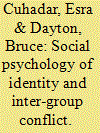

|
|
|
|
|
| Publication |
2011.
|
| Summary/Abstract |
This paper reviews the seminal theories of social psychology which have guided scholarship on inter-group conflicts and describes how these theories have been used by conflict resolution practitioners to design Track Two diplomacy initiatives among citizens in conflict zones. The authors hope that such a review will provide scholars of conflict resolution and international politics with a better understanding of how complex social theories are adapted for use in the applied world, and how gaps between theory and practice can be identified and addressed. The paper begins with an overview of three of the main theoretical contributions of social psychology to the problem of inter-group conflict: social identity theory, stereotyping and prejudice, and contact theory. We then review how these theories have been applied by conflict resolution specialists in international and ethnic conflicts as they have sought to moderate intergroup hostilities in conflict zones. The paper concludes with an analysis of the gaps between theory and practice, namely: theory of change gap, transfer strategies gap, and unit of analysis gap. Finally, based on the reviewed social psychology research, the article makes policy recommendations about how these gaps between theory and practice can be narrowed.
|
|
|
|
|
|
|
|
|
|
|
|
|
|
|
|
| 16 |
ID:
094413
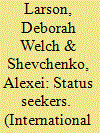

|
|
|
|
|
| Publication |
2010.
|
| Summary/Abstract |
The United States needs support from other states to carry out global governance, particularly from rising powers such as China and Russia. Securing cooperation from China and Russia poses special problems, however, because neither state is part of the liberal Western community, ruling out appeals to common values and norms. Nevertheless, an alternative approach that is rooted in appreciation of China's and Russia's heightened status concerns may be viable. Since the end of the Cold War, Chinese and Russian foreign policy has been shaped by the goal of restoring both countries' great power status, which received major blows after China's Tiananmen Square repression and the Soviet Union's breakup and loss of empire. This desire for status can be explained by social identity theory, which argues that social groups strive for a distinctive, positive identity. Social identity theory provides a typology of strategies that states may use to enhance their relative status and suggests appropriate responses to status concerns of rising powers. Redirecting scholarly attention to status considerations and incentives could contribute to a diplomatic strategy for engaging rising powers.
|
|
|
|
|
|
|
|
|
|
|
|
|
|
|
|
|
|
|
|
|